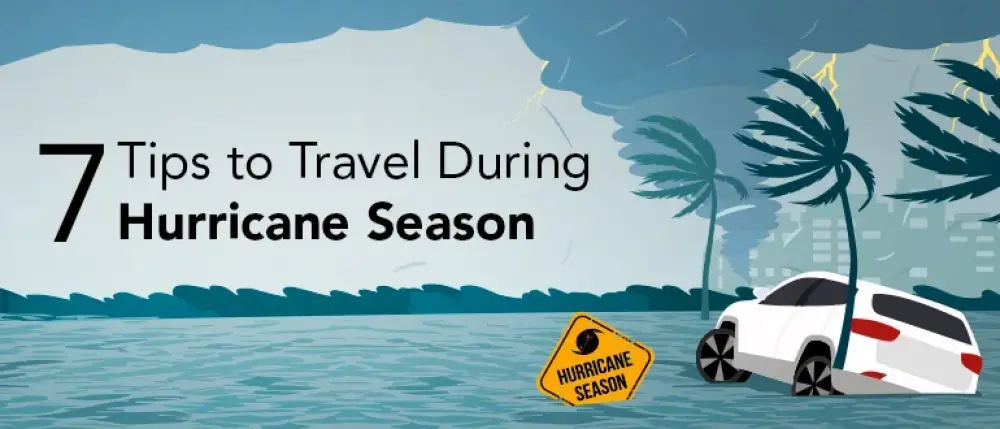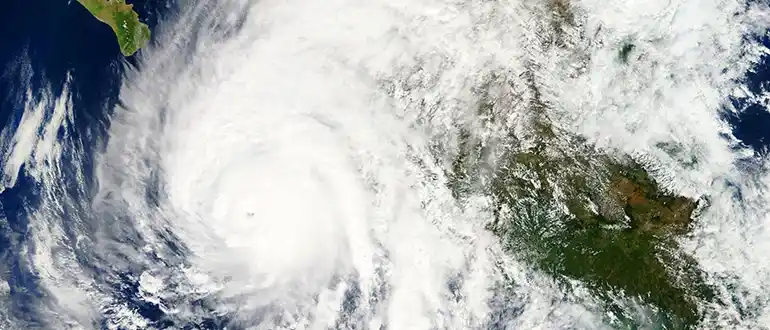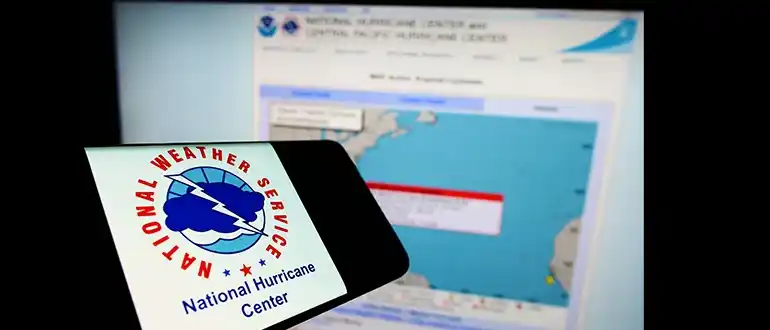Subscribe to get weekly insights
Always stay up to date with our newest articles sent direct to your inbox
Published on 17 Jun, 2024
Updated on 6 Aug, 2024
262 Views
4 min Read

Written by Mudit Handa
0Like
Be the First to Like
The monsoon season is about to begin, and people from all around the globe will soon be planning recreational trips to various locations.
You must also have planned to embark on an adventure trip to one of the most beautiful natural wonders of the world.
But wait! Something intimidating might halt your plans! The season of hurricanes is going to begin soon. Those who have watched the movie Hurricane Season, based on the aftermath of Hurricane Katrina, know that the intensity of nature’s fury is no great wonder.
So here is a complete travel guide for the hurricane season that will educate you on coping with an emergency while travelling to hurricane-prone zones.
Before that, you must know when the hurricane season comes every year.
Officially, the hurricane season in the Atlantic basin begins on June 1st and continues until November 30th every year. However, tropical cyclone activity may sometimes start before and continue even after November. Usually, the peak of hurricane activity in the Atlantic region is observed around September 10 and often continues till mid-October.
The National Oceanic and Atmospheric Administration (NOAA) in the US considers the two most significant hurricanes in human history based on the wind speeds and lowest pressures. Those two hurricanes are Allen and Wilma.
Concerning the intensity of the winds, Hurricane Allen, which hit St. Vincent and the Grenadines on 4th August 1980, is considered the biggest hurricane in history. Hurricane Allen was a record wind holder with the highest reported wind speed of 130mph. The cyclone began in the central Atlantic Ocean and peaked in the Caribbean. When the hurricane entered the southeast Gulf of Mexico, the sustained wind speed hit the 190 mph mark. As many as 500 people were rendered homeless as a result of Hurricane Allen.

While Allen holds the world record for the highest wind speed, Hurricane Wilma made the global record for the lowest recorded pressure in the Atlantic basin. The rule is that the lesser the pressure in the ocean basin, the greater the hurricane's intensity.
Wilma hit near Cape Romano in Collier County, Florida, on 15 October 2005. A drop-sonde from Hurricane Hunter aircraft flying over the Caribbean Sea recorded the barometric pressure of Hurricane Wilma as a minimum of 882 millibars, the lowest in the basin's history. Hence, Wilma was listed in the Guinness World Records 2006.
Here are the 7 most essential tips you must not overlook before planning your trip in the hurricane season.

Before planning your trip during hurricane season, you must carefully review the basic information about your destination. It includes—
The current Travel Advisory level;
This information is available on the US Department of State website.

Although medical facilities and providers are readily available abroad during the natural hazard, they may require cash in advance due to the vast crowds.
Hence, it is highly recommended that you have international travel insurance before your trip. Such an insurance plan can cover unforeseen medical emergencies, trip cancellations, and trip delays.
However, you must check whether your international travel insurance policy covers you in the region where you are travelling. If not, you must consider buying region-specific travel insurance.
Emergency services like medical evacuations can cost around $100,000 or even more. If you have a travel insurance policy, your insurer can even provide you access to the Indian embassy/consulate near the hurricane-affected zones.

An emergency kit is a must while travelling abroad. During the hurricane season, minor weather disturbances can suddenly become a tempestuous storm. So, even if you have a permit to travel to a hurricane-prone area during this time of the year, always keep an emergency kit ready. This kit must contain the following three things:
Other essentials for the emergency kit are recommended on US Department’s Build A Kit portal.

In India, the Ministry of External Affairs has created the MADAD ('MEA' in Aid of Diaspora in Distress) portal to monitor consular grievances. You can register your grievance on MADAD portal to seek emergency help from the nearby Indian Embassy/Consulate. You can register grievances of any nature except regarding loss of passport or travel documents. It makes it easier for the Indian embassy or consulate to locate and help you in an emergency. The two most recent significant examples of the success of the MADAD portal are–

While on an international trip, it is always advisable to stay aware and vigilant of global geopolitical developments by staying active on digital media. During the hurricane season, you can get updated information on hurricane zones from the National Hurricane Center. Here, you can get the latest news and weather forecasts.

During hurricane season months, the slightest of winds can develop into the deadliest hurricane, rendering you completely helpless. Hence, you must contact your local tour operator during an emergency. Besides, following up with hotel staff and local authorities can help you quickly evacuate from the storm surge zone.

During a natural hazard, you can get emergency help only from your native agencies and departments. Hence, you must save all the contact information of the Indian Embassy / Consulate nearest to the storm surge zone. The contact details of the Indian consulates can be found at the Indian Missions Abroad portal.
As discussed above, despite the availability of essential medical help in a hurricane-affected zone, you might face certain inconveniences during the evacuation process. Sometimes, a medical emergency can pose a substantial financial burden on you in a foreign land. Hence, you must have a travel insurance plan that covers all your medical expenses in times of unforeseen emergency.
Besides, with ideal travel insurance such as Care Explore, you can receive complete assistance during unforeseen situations, such as losing your passport and other travel documents.
Important Tip: The above blog is for reference purposes only. Please refer to the official websites of your destination to stay updated about the country's climate changes.
Disclaimer: Plan features, benefits, coverage, and claims underwriting are subject to policy terms and conditions. Kindly refer to the brochure, sales prospectus, and policy documents carefully.
Be the First to Like
List of 10 Countries Where the Indian Rupee is Stronger Munmi Sharma in Travel Insurance Articles
इंडिया से दुबई जाने का खर्चा क्या है? जानें, वीजा से जुड़ी जरूरी बातें Munmi Sharma in Travel Tips
How to Find File Number in Passport - A Step-by-Step Guide Munmi Sharma in Passport
What Is Non-ECR Category In Passport? How to Apply in 4 Easy Steps? Munmi Sharma in Passport
New Year, New Adventures: Kickstart Your Travel Resolutions with Confidence Care Health Insurance in Travel Tips
Winter Wonderland: Top Destinations for a Magical Christmas Getaway Care Health Insurance in Travel Tips
Currency Exchange in Europe: A Handy Guide Care Health Insurance in Travel Tips
Essential Travel Tips for a Memorable Trip to Fiji Care Health Insurance in Travel Tips